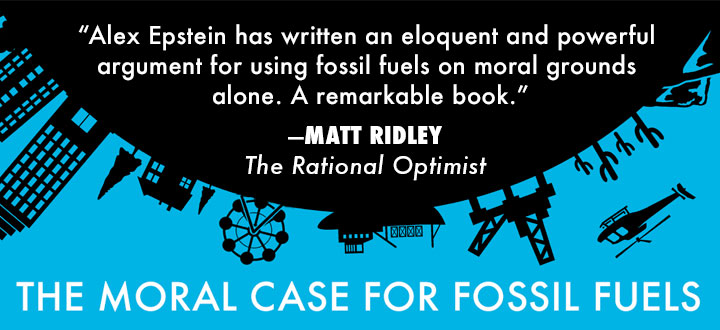Alex Epstein, president and founder of the Center for Industrial Progress (CIP, at IndustrialProgress.com), has written a new book, The Moral Case for Fossil Fuels, in which he advances the “moral case for using cheap, plentiful, reliable energy to amplify our abilities to make the world a better place—a better place for human beings.” Recently he shared his thoughts about his book and related work. —Ari Armstrong
Ari Armstrong: Congratulations on the new book; it is an impressive and urgently needed work. Many of our readers are interested in defending free markets and industrial civilization. How will reading your book help them in this regard?
Alex Epstein: Fossil fuel energy is the motive power of industrial civilization—it is one of the most important products of the free market. And, yet, it is widely misunderstood and misrepresented, to the point that the freedom to produce it is in peril. The Moral Case for Fossil Fuels sets the record straight.
Armstrong: In your first chapter, you draw an important distinction between someone you call a “humanist”—“someone on a human standard of value, [who] treats the rest of nature as something to use for his benefit”—and a “nonhumanist,” who holds as his “standard of value . . . ‘pristine’ nature or wilderness” and who “treats the rest of nature as something that must be served.” It seems to me that the success of the environmentalist movement rests largely on confusing these moral standards with the claim that human well-being depends on leaving nature as pristine as possible. What are your thoughts on this? And how would you suggest people work toward establishing clarity in such matters?
Epstein: I’d partially agree with you, but only partially. Environmentalists definitely put forward what I call the “fragile mother” view of nature: The current state of nature is this perfect balance that nurtures us, but if we disrupt it we will be ruined. Taken anywhere near literally, that view is bizarre; where was this nurturing mother for all of human history pre-fossil fuels? Man survives by transforming nature to meet his needs. Of course, he can make mistakes and be counterproductive in this transformation, but the solution to that is better action, not inaction—and inaction is the essence of “leaving nature as pristine as possible.”
The “fragile mother” or “delicate balance” view of nature is popular in large part because it serves as a convenient rationalization for the generalized guilt that people feel because they equate morality with self-sacrifice. It also serves as a rationalization for statists trying to prove the necessity of them holding nearly unlimited power over the rest of us.
Armstrong: You write that, not only have fossil fuels made possible longer lives for more people, but in the “last eighty years” they have helped facilitate a decrease in the “annual rate of climate-related deaths worldwide by an incredible rate of 98 percent.” Would you walk through the essentials of what that figure means and how you derived it?
Epstein: I discuss this extensively in chapter 5 (“Climate Mastery”), because it’s an unfamiliar and surprising statistic to most. . . .















